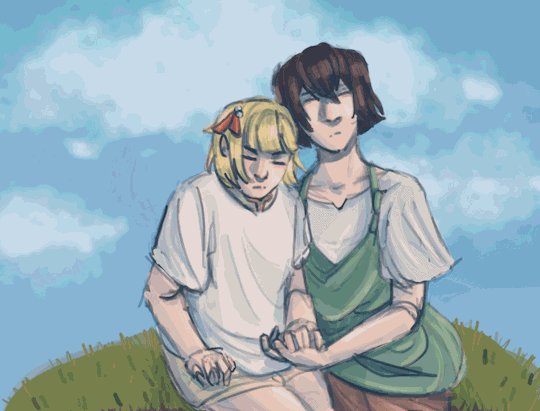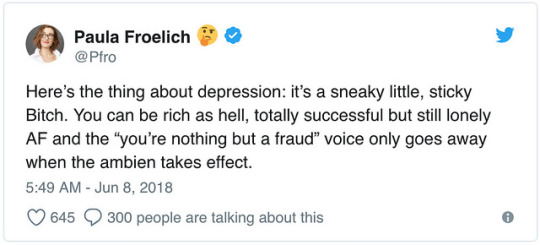#i might post a better version if school doesnt kill me this month
Text

I'll keep my eyes closed with you like this.
#this seems so low effort#but the truth is that i was bawling my eyes out while i drew this#its also been a pain in the ass exporting it#i might post a better version if school doesnt kill me this month#imma be honest. it still looks like shit and i dont know what to do#anyways. i love sami#children of the whales#chakuro#sami#oh my god chakuro looks like dazai here#my art
2 notes
·
View notes
Text
The death of Anthony Bourdain: Thoughts on productivity, pleasure, and depression
Shares 141
Warning: This is a rare GRS post that contains salty language. If you dont like salty language, dont read this article.
Anthony Bourdain killed himself Friday morning.
So what? you might be thinking. Hes just another fucking celebrity who didnt know how good he had it. Maybe youre right. But his death has weighed heavy on me all weekend.
On Friday morning, as I wrote the weekly Get Rich Slowly email, I thought about Anthony Bourdain. On Friday afternoon, as Kim and I worked in the yard, I thought about Anthony Bourdain. On Friday evening, as we soaked in our new hot tub with a friend, I thought about Anthony Bourdain. Yesterday, I thought about Anthony Bourdain. Today, I thought about Anthony Bourdain.
Now Im writing this article as an act of catharsis. Maybe itll help me to stop thinking about Anthony Bourdain.
The Depression Trap
I believe Anthony Bourdains death touched me deeply for a couple of reasons.
I was a huge fan. Since listening him read the audio version of Kitchen Confidential a decade ago, Ive loved his work. Parts Unknown was probably my favorite travel show: raw and real and filled with food. Bourdain connected with everyone he met. His joy for life was contagious and his mind was sharp.Like Bourdain did, I struggle with depression. All my life, Ive experienced periodic descents into darkness. The first time this happened, I missed five weeks of sixth grade. In the nearly forty years since then, Ive developed a variety of coping mechanisms but they dont always work. In recent months since the middle of March the darkness has deepened and I dont know why. (And just as I missed five weeks of school back then, Ive been unable to get my work done in the present.)
Let me make it clear that I am not suicidal. Right now, the biggest symptom of my depression is my inability to get shit done. But whereas suicide seems strange and senseless to most everyone else, depressives understand the appeal even if wed never consider it personally.
One of the many stupid things about depression is that the condition doesnt care how awesome your life is. It doesnt care how successful you are. It doesnt care how much money you have. Depression is not rational. If it were, itd be easy to think your way out of it.
Paula Froelich, one of Bourdains ex-girlfriends, put it like this:

Bourdains death didnt just make me introspective. It also led to a couple of interesting conversations about pleasure and productivity and about what really matters in life.
The Productivity Trap
Friday afternoon, I received email from a GRS reader well call Michael:
Im sure you saw Anthony Bourdain killed himself. This to me was a telling quote:
When asked during a recent interview with The Wall Street Journal whether he ever thought about stepping back from the breakneck pace of a job that kept him on the road 250 days a year, he replied, Too late for that. I think about it. I aspired to it. I feel guilty about it. I yearn for it. Balance? I fucking wish.'
Obviously I didnt know Bourdain personally, or even know much about him as a public figure, but I think that mentality is common: Once youve become successful, the thought of ever ratcheting back seems unthinkable. Obviously, suicide is rare, but I think this mentality is common among successful people they stay in an unhappy status quo simply because they have so much invested in their self-image and public perception of themselves as successful people.
I think Michael is onto something. Ive seen this in my own life, in the lives of friends and family, and the lives of colleagues. They fall into what you might call the productivity trap. (Heres an article I almost linked to the other day about the productivity trap: If youre so successful, why are you still working 70 hours a week?)
I have one friend, for instance, with an enormously successful career. He has a popular blog, a popular podcast, best-selling books, and even an annual conference that attracts attendees from across the planet. Yet hes never satisfied not with himself nor with anybody else. Hes always looking for ways to make things bigger and better. He seems unhappy with who he is and what he has. Hes written publicly about his struggles with mental illness, but he hasnt revealed its full effects.
Its not just my friend. Its me too. I see this pattern in my own life, and its something Ive deliberately decided to approach more mindfully. Why do I want to have a hot tub or travel to Ecuador? Why did I repurchase Get Rich Slowly and how often should I publish here? Why do I keep agreeing to public speaking gigs? Do I really want these things? Are they aligned with my personal mission statement? Will they really make me happy? (Sometimes the answer is yes. Sometimes the answer is no.)
In his email, Michael continued:
I think this is really the key to personal finance and early retirement actually stepping back and figure out what is important to you, and doing it, even if it seems like youre turning your back on a great career, or a nice house or whatever. That is the hardest part, which keeps most people in a life they dont want. They think I went to school X or work at company Y, so therefore I must live in this city or have that job or have that wardrobe and never ask themselves what, as individuals, makes them happy.
The Pleasure Trap
As our email conversation continued, Michael brought up another interesting point. He noted that our culture and this is especially true in the world of financial independence blogs is obsessed with experiences, such as travel. Yet in many ways, collecting experiences is no better (nor any different) than collecting things.
Heres Michael again:
[Bourdain] had the ne plus ultra of modern life: rich, famous, a job that 99% of the population would kill for, saw everything he wanted to see, ate everything he wanted to eat, Im sure slept with tons of women if that is what he wanted, took all the drugs he wanted. You name it, he had it. And, he hung himself in a hotel room in France, a twice-divorced man a continent away from his daughter and girlfriend.
Im not bagging on him. I just think he illustrates something: A meaningful life doesnt consist of a series of cool experiences, or traveling or eating cool stuff. Bourdain did that stuff to an incredible degree, and it still didnt make him happy.
I think that is what our society has forgotten. I feel like were always being told we should move a lot, travel a lot, be vaguely or overtly dismissive of the town or state we were born in, move for college and never move back homein short, basically be a free agent with fewer and fewer personal connections, or weaker connections. And, we get this [higher suicide rates].
[]
I think this relates to personal finance. There is always this thought that thrift requires these huge sacrifices less travel, fewer new experiences, fewer new restaurants. But what if [these arent sacrifices]? What if irrespective of cost, that stuff isnt really a source of happiness? I mean, people accept that with respect to possessions nobody says a Cadillac or a 5000-square-foot home is the key to happiness but many, many people in our culture think new experiences are crucial to a happy life. It may be the opposite the continuity and free-time to invest in loving relationships may actually be the key to happiness.
I told Kim about my conversation with Michael. Its the pleasure trap, she said. People fall for the lie that momentary pleasure equals happiness. But pleasure isnt the same as happiness.
Shes right, of course. Happiness is like planting a garden, watching it grow, then enjoying the harvest. Pleasure is simply eating the fruit. Happiness is deeper and richer and longer lasting. Pleasure is fleeting; happiness is not. But happiness involves time and work and patience.
Now, Ill admit: Im guilty as anyone else of falling into the pleasure trap, and in oh-so-many ways! I have to make a deliberate effort to look past immediate pleasure in order to consider long-term happiness. This often requires enduring unpleasant activities. Do I really want to go out in the cold and the rain to dig in the mud and plant my garden? No, not in this moment. Id rather sit in the hot tub. But if I dont plant the garden, Im sacrificing greater happiness in the future.
Final Thoughts
While I think that Kim and Michael are onto something the productivity trap and the pleasure trap are both real and both problematic I keep coming back to Anthony Bourdains battle with depression.
During my recent road trip through the southeastern U.S., I talked with two friends who are fighting depression in their own lives. One friend has a spouse who cannot shake the condition despite counseling, despite exercise, despite a loving family. The other friend fights the condition himself and its led to weight gain and addictive tendencies. Therapy has helped some but its not a cure-all.
As for myself, I havent yet returned to therapy although Im considering it. (Not so long ago, I spent a year working with a therapist to find ways to cope with anxiety and depression. It helped.) I want to stress again that I am not suicidal. But the depression has most definitely affected my daily existence, including my relationships, my health, and my work here at Get Rich Slowly.
It sucks. It sucks. It sucks. But I know that itll get better someday.
Shares 141
https://www.getrichslowly.org/death-of-anthony-bourdain/
0 notes